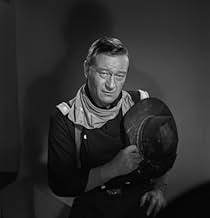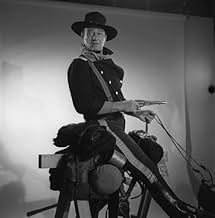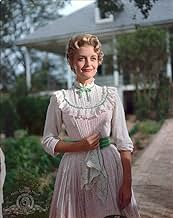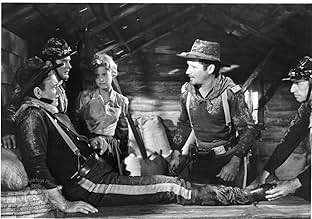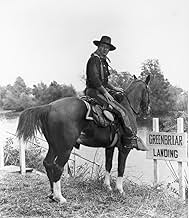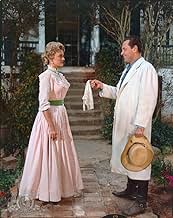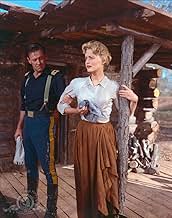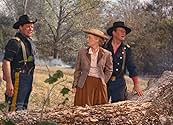En 1863, un batallón de La Unión debe hacer una incursión tras las líneas confederadas en Mississippi para destruir los ferrocarriles enemigos, pero una bella prisionera sureña y el médico d... Leer todoEn 1863, un batallón de La Unión debe hacer una incursión tras las líneas confederadas en Mississippi para destruir los ferrocarriles enemigos, pero una bella prisionera sureña y el médico de la unidad causan tensiones dentro de las filas.En 1863, un batallón de La Unión debe hacer una incursión tras las líneas confederadas en Mississippi para destruir los ferrocarriles enemigos, pero una bella prisionera sureña y el médico de la unidad causan tensiones dentro de las filas.
- Dirección
- Guionistas
- Elenco
- Premios
- 1 nominación en total
- Dirección
- Guionistas
- Todo el elenco y el equipo
- Producción, taquilla y más en IMDbPro
Opiniones destacadas
It's the Western Theater of the war and General Grant is setting up his siege of Vicksburg. In order to help ensure his position, he orders Colonel John Marlowe (John Wayne) to head south towards Newton Station, Mississippi, the Confederacy's main train station for supplies to Vicksburg, to destroy any contraband as well as the railroad itself. The mission requires secrecy and guts, heading hundreds of miles into enemy territory, and Marlowe is the man to do it. Before he sets out, he's assigned a new officer, Major Henry Kendall (William Holden), a surgeon who refuses to carry a gun. There's antipathy between the two men from the moment Kendall shows up in camp, but Marlowe follows his orders and takes him along.
In Mississippi, the column soon comes across an isolated country home, Greenbriar, where Hanna Hunter (Constance Towers) and her servant slave Lukey (Althea Gibson) are waiting out the war. After some feigned hospitality, Kendall notes that Hunter is spying on Marlowe's officer meeting, hearing their plan to head straight through past Newton Station once it's sacked to Baton Rouge. Feeling like there's no choice, Marlowe decides to take Hanna and Lukey along so they won't give up the column's position, mission, or destination. So begins the ineffective romance between Marlow and Hanna that starts as a meet cute and never really moves past. She becomes slightly enamored of him because of his...well, it's not entirely clear why. He's a hard man, a dedicated Northerner, a man bred from a lower class (he's a train engineer without a formal education), but he does have a certain sense of honor that she finds attractive, I suppose, most notably when the column comes across a pair of Confederate deserters who have taken the local sheriff hostage. Marlowe gets some information from the deserters before knocking them out and handing them off to the sheriff with a tip of the hat.
There are two great moments in this film, and the first comes in Newton Station. They arrive in the little town with the people, mostly women, screaming at them to go home, and Marlowe figures out that the local Confederate colonel has set up a trap with an approaching train engine that's filled with Confederate troops. The battle that erupts is a slaughter and so poorly thought out from a military point of view that it's a wonder anyone thought it would be a good idea to include in the film (this isn't the great part, it's coming). Then the troops get to work on destroying the railroad, and it's just great to see the mechanics of what it means to tear up a railroad up to and including the creation of Sherman's neckties by wrapping the weakened iron railings around telegraph poles.
And then Wayne gives an impassioned speech about how much he hates doctors, and it's one of the oddest moments of the film. It feels like an idea made up on set rather than planned out. Marlowe hates doctors because some years ago two doctors convinced his wife that she had a tumor. They operated on her, they found nothing, and she died. To have this speech come up more than halfway through the film feels off, especially when this was the war where doctors were hacking off limbs with unclean equipment all the time. A speech about how doctors had lost him many good men during the fighting would have fit so much better. It would have applied to the situation at hand much more intimately, and operated as a direct challenge to Kendall who was in the same job. The use of a long-dead wife just feels random and off.
Anyway, the column moves on, and we get our second great moment of the film. Desperate for men (the scene ends up feeling like it should have taken place in late 1864 instead of early 1863, but whatever) a Confederate soldier shows up at the Jefferson Military School and begs for the headmaster to lead his students into battle against the Union cavalry that terrorized Newton Station. The old man, a reverend, organizing his boys of between 9 and 16 years old, into columns and leading them off to fight the dying cause (again...this fits better with a later in the war story, along with all the references to Andersonville that didn't open until 1864) while a widow begs him to let her have her only son left stay home is remarkably powerful. This could operate as a short film on its own, and it's great.
And then the students find the column, open fire, and Marlow refuses to fire on children while the movie ends up kind of treating the whole thing like a kind of joke.
The finale of the film is around a random bridge somewhere in Mississippi where Marlowe needs to fight off an approaching Confederate skirmishing force while another Confederate force comes upon them from another direction. It's not much of an action scene, doesn't seem to have much in terms of stakes, and doesn't really satisfy all that well. The actual ending of the film was apparently never shot because of the death of the stuntman during the filming of some action, and the movie simply stops with the Confederate column coming upon Kendall, who stayed behind to take care of the wounded.
This movie is kind of a mess, but there is some entertainment to be had. I find John Wayne watchable in just about anything he does, and since he's front and center for most of the film, he's an asset. Most of the looks at Confederate life carry a tinge of melancholy at their losing side that I appreciate. That bit with the boys leaving the military school is honestly outright beautiful in the anguish from the widowed mother. However, the story as a whole feels a bit random, the two major action sequences are lackluster, the romance simply doesn't work, and the professional rivalry between the two main male characters ends up feeling like something from a satire rather than a straight war picture.
I don't hate it, but this isn't exactly one of Ford's or Wayne's best efforts.
Historical inaccuracy aside though the movie did quite well. The film showed multiple viewpoints and a fair degree of respect for most of them. It showed aspects of the war that were generally ignored in other films of the period -- the bloody horror of battlefield amputations, the desire of people to give up on the whole thing (I can't think of an earlier film that talked about deserters and the way they disrupted the southern home front), and the pain of the sheer physical destruction of the war -- a pain that affected the destroyers as well as the victims, something Gone With the Wind never quite admitted.
Some posters have complained about southern belle Hannah Hunter's overuse of sex appeal to spy on Union soldiers -- while there was no historical Hannah Hunter there were plenty of southern women who did just that, including Belle Boyd, Rose Greenhow and others. Some posters have complained about the way the film trivializes slavery -- this is unfair. It underplays slavery but never trivializes it. It shows conflicts within the Union army about the institution and addresses the issue of personal loyalty between some slaves and masters without glamorizing the institution as a whole. Does the film go far enough by modern standards? No. But it goes much farther than its contemporary and treats the slavery issue more honestly than modern travesties like Gods And Generals.
One poster actually complained about how inaccurate southern snipers were -- this is completely unfair. There was no indication that the "snipers" were specially trained men with Whitworth rifles or anything like that. They looked more like ordinary troopers out skirmishing, or perhaps the even more poorly trained militia. Ordinary soldiers fired more than 100 rounds for every hit they scored, so poor shooting on either side is nothing to be surprised about.
8 out of 10
Colonel John Marlowe (John Wayne) is ordered by the Union generals to lead his army 300 miles into the Confederacy, where they are to sabotage and disrupt the vital railway supply town of Newton Station as much as possible. After a disastrous few months of lost battles and heavy casualties, the Union generals are determined to swing the battle back in their favour before the arrival of winter. Marlowe is unhappy to learn that his orders include allowing army surgeon Major Kendall (William Holden) along on the mission. Since the death of his wife at the hands of two blundering surgeons, Marlowe has had little respect for those in the medical profession. To further complicate matters, a feisty Southern belle, Hannah Hunter (Constance Towers) with Confederate sympathies, overhears Marlowe informing his men that Newton Station is the target, and that once the town has been raided the Union forces plan to head for the safety of Baton Rouge. In order to secure her silence, Marlowe has to take her prisoner and suffer her sharp Southern tongue (plus escape attempts) during the trip.
The Horse Soldiers is filmed in loving detail, with gorgeous autumnal backdrops. Its story is very interesting, especially the volatile relationship between Wayne and Holden, and the mission itself provides excitements along the way. In particular, a street battle at Newton Station is memorable, as is a scene later in the film when the Union soldiers come under attack from an army of Confederate army cadets still at schoolboy age. Towers' character is written as a very cunning and feisty woman, who disguises her attributes by coming across as a melodramatic, gossipy airhead. Towers plays the part well, but because of how she's encouraged to handle the role she becomes rather irritating too. One disappointing moment in the film comes when Wayne and Holden reach breaking-point with each other and ride off to a secluded glade to slug it out. The sequence is set to be a real humdinger, but is curiously cut short by the arrival of the enemy forces. On the whole, though, The Horse Soldiers is a good, solid Civil War entertainment, well worth a look.
¿Sabías que…?
- TriviaThe film marked the beginning of mega-deals for Hollywood stars. John Wayne and William Holden received $775,000 each, plus 20% of the overall profits, an unheard-of sum for that time. The final contract involved six companies and numbered twice the pages of the movie's script. The film, however, was a financial failure, with no profits to be shared in the end.
- ErroresIn the shot right after Hank Worden throws the torch onto the cotton bales, look at the upper left of the screen. You will see an airplane flying from right to left.
- Citas
Miss Hannah Hunter: [bending over with a plate of chicken, revealing ample cleavage] Do you prefer the leg... or the breast?
Col. John Marlowe: I've had quite enough of both, thank you.
- ConexionesFeatured in Directed by John Ford (1971)
- Bandas sonorasI Left My Love
by Stan Jones
Selecciones populares
- How long is The Horse Soldiers?Con tecnología de Alexa
Detalles
Taquilla
- Total en EE. UU. y Canadá
- USD 1,753,526
- Tiempo de ejecución
- 2h(120 min)


